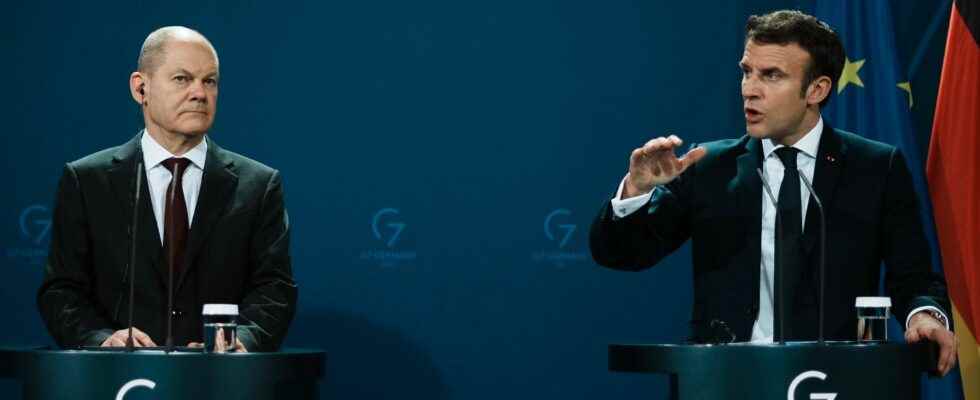“As in any French novel, in the couple, it is often the third that counts”: in 2012, the historian of international relations Georges-Henri Soutou could still summon the figure of the threesome to describe the Franco-German relationship . Paris or Berlin could then flirt with Washington, Moscow, Peking or London to make it clear to its neighbor across the Rhine that in terms of defense or industry the world was vast and life long… Today, while the Franco-German couple has just celebrated its 60th birthday, the two countries are like two young retirees who find themselves face to face and must learn to live together.
Because the Trump episode has cast doubt on Washington’s long-term reliability, London has excluded itself from the game with Brexit, Beijing no longer hides its political agenda; as for Moscow… However, everything had seemed possible when, to Macron’s invocation of “European sovereignty”, Olaf Scholz had responded with his Zeitenwende. In reality, the couple rather evokes the song by Schubert: the mother speaks of marriage when the daughter speaks of love… Has everything changed since the great reconciliation staged this Sunday, January 22 under the gold of the Richelieu amphitheater? On the energy question, what should we think of the announcements on hydrogen – the only word “nuclear” remaining visibly taboo? Very concretely, will the green hydrogen from the South of the Mediterranean go up to Germany via a dedicated infrastructure under the Rhone Valley, which France has until now been stubbornly opposed to? The months to come will tell if the Germans won their case but, to tell the truth, more than on technical subjects, the dissension relates to two questions of principle.
Fundamental differences
The first relates to the role of energy policy. Paris sees its energy policy as the marriage between a policy of social and territorial equity aimed at keeping prices low for individual consumers and support for large global groups (TotalEnergies, EDF, Engie), responsible for promoting France… and to fill the coffers of the State. Berlin is much more basic: energy policy is at the service of German industry and whether the price to be paid is dependence on Russian gas, on the Chinese solar panel industry or, today, on American shale gas, it is therefore irrelevant that German industry remains competitive. The reasoning is applied to hydrogen: Berlin will have to import 40 to 60% of the hydrogen needed for its industry.
Hence an all-out hydrogen diplomacy since mid-2019, targeting both the current fossil fuel producers and the future giants of green electricity production: Morocco, Japan, Australia, Saudi Arabia, Canada, Chile, Namibia, India, Angola, Egypt… The list compiled by a recent Ifri report is impressive. Germany is going so far as to open dedicated offices in Nigeria, Angola and Saudi Arabia. On the other hand, the French strategy is based on the emergence of a national hydrogen production sector, if possible from nuclear energy, as close as possible to industrial sites. Needless to say, Paris is more than reserved for the idea of a large European hydrogen transport network in which France would be a transit country.
Nuclear vs imports
The second Franco-German divergence stems from a different approach to the notion of energy sovereignty. France today has a radical approach to it: the time is 100% made in France, which is not the least paradox in a deindustrialized France, which, since 2015, has, without any public debate, returned its security of electricity supply in the hands of its neighbours. Is this radical pendulum movement credible? In a country not endowed with the mining resources necessary for low-carbon technologies, sovereignty will never mean independence but control of its dependencies through the diversification of suppliers, technologies, contractual terms and industrial players.
And this definition applies to the entire energy spectrum, beyond hydrogen. France should not view the global hydrogen race solely through the prism of its strained energy relationship with Germany. Good news: it seems that this point has not escaped the General Secretariat for Investment, responsible for France’s hydrogen strategy. What a relief to read this statement from last November: “And if the most important thing was our ability to […] understand the environment around us […] to constantly readjust, together, our route? But also our ability to know how to change course when the path marked out leads us to a dead end!”
